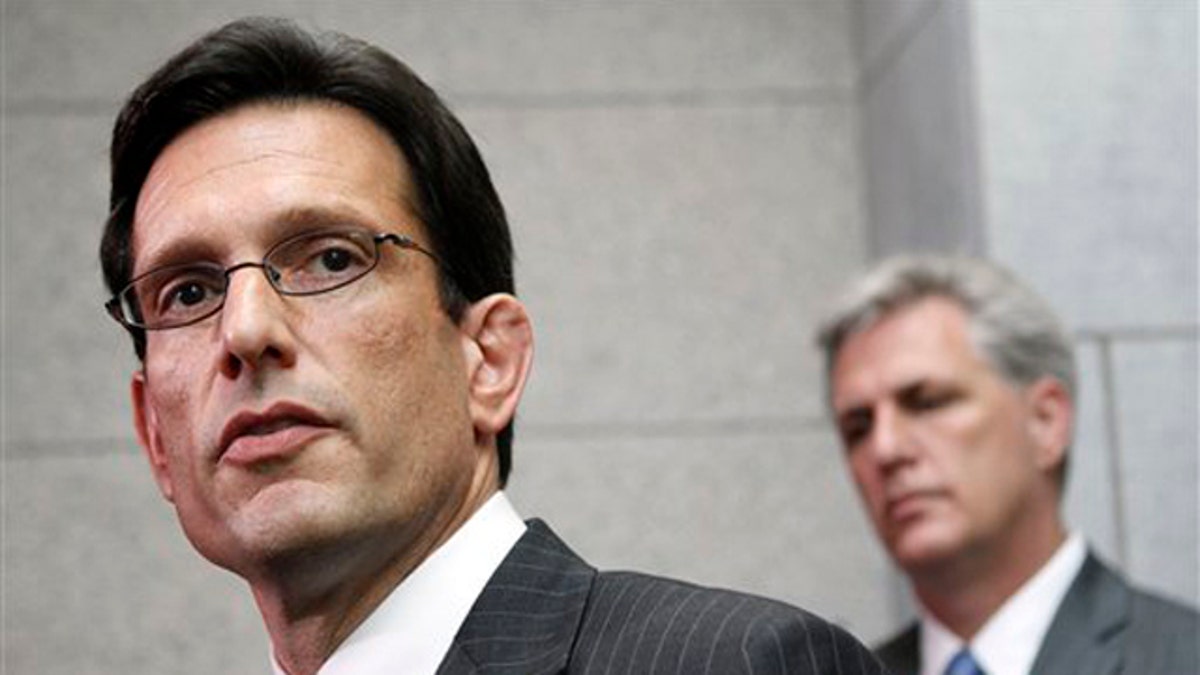
House Majority Leader Eric Cantor, left, accompanied by House Majority Whip Kevin McCarthy, speaks to reporters on Capitol Hill May 3. (AP)
After being handed a lifeline by U.S. taxpayers, bipartisan lawmakers met with the vice president Thursday to try hashing out the beginnings of a budget plan that can draw enough support to clear the way for increasing the nation's debt ceiling.
Vice President Biden, after the meeting concluded, called the sit-down "productive" and said another is scheduled for Tuesday.
House Speaker John Boehner, elsewhere on the Hill, said nothing is off the table except tax cuts and reiterated a threat that Republicans won't vote for an increase in the debt ceiling until they see "real spending cuts and budget reform."
"It is time to start talking about trillions," Boehner said.
The federal government is expected to reach its $14.3 trillion debt limit by mid-May. With that deadline right around the corner, Treasury Secretary Timothy Geithner informed Congress this week that his department would begin taking "extraordinary measures" to buy more time. Geithner had earlier estimated those measures could keep the country under the debt ceiling through mid-July, but on Monday said, "stronger than expected tax receipts" will help push that absolute deadline back three weeks to about Aug. 2.
Though this gives a deadlocked Congress more time, Geithner warned: "I caution strongly against delaying action."
The meeting with the vice president marked a first step toward resolving the vast differences between the parties in how to address the nation's persistently gaping deficits. The debt ceiling vote continues to put added pressure on talks -- many Republicans, and even a few moderate Democrats, have threatened to balk on that vote unless they see significant spending cut commitments. Geithner and others in the administration warn this would be a grave error, and send the nation into default.
The Washington Post reported overnight that senior GOP leaders are now ready to compromise, acknowledging that their original plan to overhaul Medicare may not get enough support. The Post originally said in a headline that Medicare had been "dropped" from the GOP budget plan, but House Republican Leader Eric Cantor's office refuted the claim, apparently prompting a correction. Cantor's office said Republicans continue to stand by the budget offered by Republican Rep. Paul Ryan.
"Eric made very clear that our position is the Ryan budget which -- as you know -- assumes a debt limit increase and includes Medicare, Medicaid and $715 billion in mandatory savings," his office said in a statement. "Whether the Democrats will agree to the proposals we've outlined is yet to be seen, but that is our starting point so we don't continue to kick the can down the road and make real cuts and real reforms this year."
Ryan said Thursday he doesn't expect a "grand slam agreement" but is hoping for "a single or a double."
The Republican "starting point" and Democratic starting point are far apart. Republicans outlined a plan they claim would cut deficits by $4.4 trillion over a decade. The White House outlined a plan they claim would cut $2.9 trillion over the same period. The details, though, are drastically different. Most notably, Ryan's plan would eventually end direct government Medicare payments to doctors and instead subsidize the cost of private insurance plans for seniors. President Obama's plan takes more modest steps on entitlements, though some have questioned whether they could achieve enough savings.
In between the two plans, others have been working on budget plans of their own. The so-called "gang of six," a bipartisan group of six lawmakers, has been working for months on a budget but so far has not produced anything.
In a troubling sign for those talks, Senate Budget Committee Chairman Kent Conrad, D-N.D., a member of the group, on Tuesday said he plans to personally introduce a fiscal 2012 budget "as early as next week." That plan, he said, would be modeled in part after the findings of the president's fiscal commission, and cut deficits by $4 trillion over 10 years.
The senator said while he remains "very hopeful" the gang of six will produce a final plan, "I'm running out of time."
According to numerous sources, the group is not expected to produce even a draft product this week. Conrad said the group's work "may or may not be completed" by the time he moves on his own budget, but no one should surmise from his independent move that the gang has failed.












































